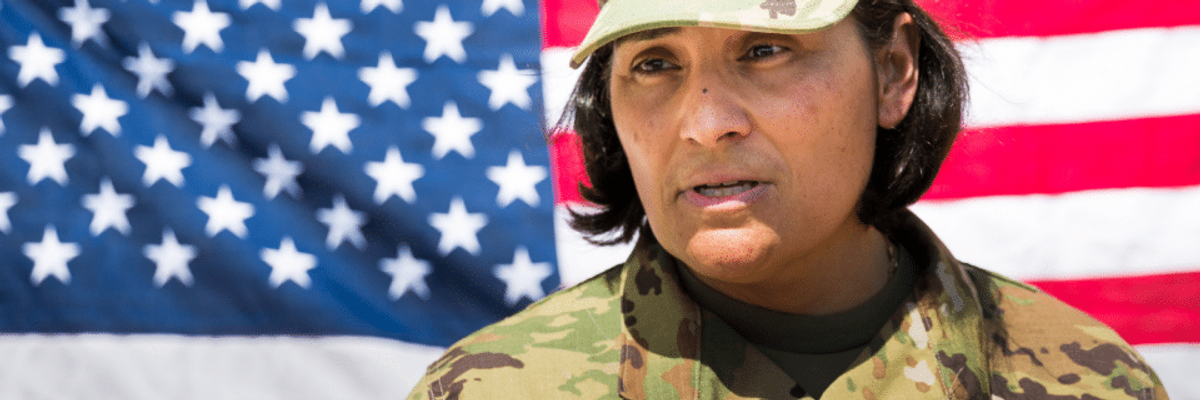
Latinx Veterans Sacrifice for their country, but their Country often Casts them Aside
Veterans in the U.S suffer an inordinate amount of injustices, some of them unfathomable, at the hands of the government they swore to protect. From lack of healthcare to homelessness, the list is long and well documented. When it comes to the Latino veteran population, more specifically Latina veterans, these struggles are oftentimes worse, and because the Latina military and veteran population is still a small percentage of the overall veteran population, their specific struggles are largely ignored.
Misogyny, Sexual Harassment and Assault within the military
In the tragic case of Vanessa Guillen’s murder at Ft. Hood, her disappearance wasn't a priority for the military or the media for months. It took the family’s ceaseless efforts to finally get the attention of the media which then pressured the military to actively investigate Guillen’s disappearance until her body was ultimately found.
Less than two years later at the same Army base, Private Ana Basaldua Ruiz died under questionable circumstances that were ultimately ruled as death by suicide. Ruiz's mother Alejandra Ruiz Zarco stated in an interview with Telemundo that her daughter had told her a few weeks prior to her death that an Army superior was harassing her and that she allegedly received constant sexual advances from other people.
The loss of young Latinas in the military reignited a long-standing discussion about the need for systemic changes within the military to solve a problem that has always existed: the misogynistic and highly toxic sexist military culture. Many Latina and women Veterans have spoken out about their own experiences when serving, and how the harassment they endured made their service to their country even more difficult.
Many put their trauma on display and told stories of sexual harassment, humiliation, and gender-based discrimination. Their voices, while important and courageous, continue to be silenced and ignored. Little research and testimonials exist specifically about Latinas in the military.
Inclusion
Despite the challenges, Latine veterans have frequently raised their voices to demand better treatment. Latinos make up about 16 percent of active duty service members, and Latino veterans make up about 6% of the veteran population in the US and many have spoken out about how they’re still not treated as Americans, even after serving their country.
Latino Civil Rights organization American G.I. Forum fought a legal battle for Latinx veterans demanding that Latine veterans receive what their white counterparts received by default: GI benefits, including medical care, education funding, as well as equity in schooling and employment. To add insult to injury, there are hundreds of veterans who have been deported forcing many to live in exile without medical care for the injuries they sustained while they were in service to the United States.
Culture
Many Latinos join the military to feel a sense of accomplishment because they are protecting their families and making them proud. Studies have shown, however, that Veterans often struggle to adjust to their family life once they’ve returned from service, and while this can be a difficult adjustment for anyone of any race, the significance for Latinos who tend to have very close family dynamics is undeniable.
Veterans often struggle with issues such as PTSD, depression, and other mental health issues. This is further compounded in a community that already has serious issues regarding mental health. Mental health in the Latine community, especially amongst men, is highly stigmatized so seeking help can also be more complicated for a Latine veteran because of cultural stigmas and mores. These issues often lead to domestic violence and other types of violence. For many Latine people, family is at the root of everything, and facing these struggles proves incredibly difficult.
Will it get better?
There has been an increased amount of advocacy for veterans in recent years, from high profile celebrities like Jon Stewart dedicating entire episodes of his shows to the topic to media covering the issues they face with more scrutiny, to Congress actually increasing support and benefits for veterans, the signs are there.
With a government so willing to ship people off to war, it makes sense that only 17% of Congress has actually served. Congressman Ruben Gallego (D-AZ) recently released a book that details his time in the “Lima Unit,” the hardest-hit Marine unit during the Iraq war. It’s at least one more sign that veterans will one day get more than a salute and a thank you a few times a year.











